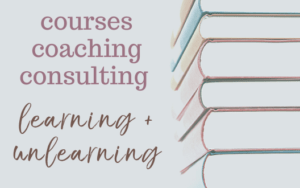I’ve encountered this question in recent weeks, since announcing the e-course “Career Discernment for Academics: Aligning Career with Commitments.”
Over the past 2-3 years, since working through my own career discernment process and writing about it in Inside Higher Ed, I’ve been thinking about why I’m drawn to the word “career discernment” rather than career exploration or advising or coaching or other options. And now I’m being asked time and again:
What is career discernment?”
As an answer to this question, career discernment includes exploration, coaching, and much more, as I describe in the course description, but it also signals a willingness to approach career questions through a reflective, ongoing, and contemplative process.
Truly, career discernment involves all sorts of reflective decision-making—much of it stretching beyond one’s work life—because the questions of what, where, when, with whom, and why we’re called to our careers involve a lot of other BIG questions, including how we understand ourselves, our place in the world, the possibilities available to us, and much more.
More than career exploration or coaching, career discernment invites us into a process of slowing down to inquire into life, both looking at this moment and engaging in long-term planning. For me, such a process begins with the question of commitments, or what we’re dedicated to in life.
I use the language and orientation of commitments, priorities, urgency, values, and relational responsibilities not only because these are matters of everyday living for justice but also because these matters inspire questions about what fires us up, what inspires us, what calls for our attention, and what work we’re called to do in this world, at this time, where we’re situated …
In this way, career discernment is deeply rooted in the essence of what gives life meaning. I know that such questions can feel BIG and tough, but they are the very ones worth asking.

This photo of exposed tree roots reminds me of how deeply rooted questions form the base or anchor from which growth occurs. In other words, we need to “root to rise” or build a strong foundation for continued learning.
In recent days, I’ve been asked about navigating an academic job search, declining a job offer, recovering from burnout, explaining a gap in employment, creating a writing community, and finding mentors in a new field. These are certainly among career discernment questions.
So are other matters that I’ve been discussing recently, including shifting daily habits, cultivating an attitude of abundance, recognizing trauma and triggers in daily life, countering oppressive institutional cultures, navigating changing relationships, setting boundaries, keeping an intuition journal, and settling into a new home space.
This list could go on, but I hope that these examples give a sense of what career discernment entails and why it’s much more than looking into interests, passions, and potential employment.
* * * * *
Now that we’re into summer, perhaps you’re similarly interested in undertaking a career discernment process, one of following your “strong yes.”
If so, I hope you’ll consider this e-course, which includes freewriting suggestions, discernment practices, a resource guide, and one-with-one coaching—time for working with and having conversations around a range of matters.
I’m happy to talk about whether this course is right for you or whether you’d like to bring it to your campus or organization. Reach out to schedule a free consultation.
—
This post is written by Beth Godbee for Heart-Head-Hands.com. For related posts, you might try “Deciding to Leave Higher Ed: Strategies for Career Discernment” and “Planning a Career Change in 3 Stages.”
If you appreciate this site, if you connect with the storytelling, or if you use any of the recipes or resources, consider making a one-time or sustaining donation. Please also consider subscribing to posts and liking this blog on FB. Thanks!
*****
Interested in listening to this blog post?
Check out my SoundCloud account, and subscribe for new audio content.




This is so interesting. I’m wondering if it would be useful for those of us in retirement for discerning where to focus our energies now that we have more free time. But I have never been able to think “long term” and not sure I would be able to learn at this late (77 year old) date.
Sonia, thanks for this response and for highlighting the use in retirement. 🙂
I truly believe there are multiple versions of “long-term thinking,” so it may be more about choosing what’s “long term” to you (pushing beyond a few days? a few weeks? into next year?) …
Sending so many good wishes for continuing to discern where to put energies,
Beth